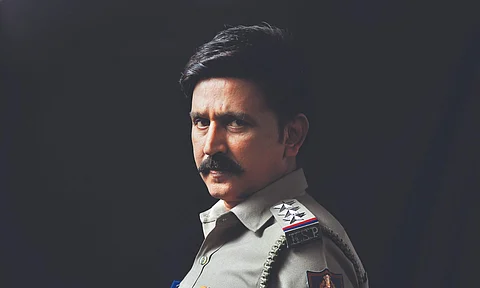

Ramesh Aravind is a 150-film-old multilingual actor, who has also thrived as a filmmaker. His upcoming film, 100, marks his tenth directorial and is set to hit the screens this Friday. Ramesh reveals that his directorial aspirations began when he was just four films old, but he could become one only after completing a century of films. In this interview, he shares his thoughts about 100, wearing a khaki uniform, and how the film comes with an interesting package.
Excerpts:
‘Positioning of a hero is very rare in cinema, one can become a director even at the age of 60, said
K Balachander’
“I was directing my skits in college, which I also wrote and acted in. Once I became an actor, I was noticing the technical things and always had my eyes on how the camera moves, why they use trolleys, and I observed everything with the intention of learning. However, it was my mentor, K Balachander who said ‘Positioning of a hero is very rare in cinema, and only a few people get there, and he mentioned that one can become a director even at the age of 60.’ Despite being an actor, I was always part of my directorial team in many of my films. I used to brainstorm with the directors, and they respected my views,” says Ramesh Aravind.
‘100 is an aspirational number’
The director was toying with titles like Chanakya v/s Chanakya, Zebra, and finally chose to name the film 100. “It was a cop story, and 100 was unique and attractive. The title was universal, and even if we have to dub the film in Spanish, you don’t have to change the name. The figure is extremely positive -- like the whole stadium claps when a cricketer scores a century. A pat on the back by a teacher to a student, when they score a centum. Overall 100 is an aspirational number, and also happens to be the police helpline. There is a small catch with the title, and it will be revealed in the film,” says Ramesh, also sharing that COVID-19 was the only speed breaker for the film. “We had the film censored and ready for release. In fact, we wanted 100 to hit the screens on the 50th day of Shivaji Surathkal, but the pandemic happened. When we wanted to come back, we wanted to bring the film out with 100 percent seating capacity, and when it happened, we latched onto it,” he says.
‘Mixing thrills in a family genre is always an interesting space to play in’
Ramesh says that the combination of a proper family subject and thriller elements sets 100 apart from his other directorial projects. “My first directorial, Rama Shama Bhama, was a family entertainer, and so is 100. But the latter will have a lot of tense moments. Mixing thrills in a family genre is always an interesting space to play in. If you bring in a family drama into Shivaji Surathkal, it too would have been a film like 100,” he says.
‘The power of Khakhi’
The director, who also plays the lead in 100, dons the khaki in the film. “A uniform, be it the navy, army, or police, it only builds confidence and you feel powerful. From the sets to the crowd, we are respected everywhere, and you feel more proud about it,” he says.
‘As a director, there is too much to handle’
Ramesh Aravind, who has an enormous work to showcase as an actor, the orator, a well-known host, has equally carved a niche as a film director too. So what is more interesting for him now, acting or direction? “After a certain point, I got comfortable in acting. As a director, there is too much sweat to handle, and there is a lot more thinking. Holding a director’s chair, there is a constant flow of creativity. What begins with a pen and paper, will continue till the release date, and post as well.”
‘Cinema is a collaborative medium, and every input helps me’
100 brings in an interesting package of cast and crew, including producer Ramesh Reddy, DoP Satya Hegde, composer Ravi Basrur, and editor Akash Srivatsa. “Cinema is such a collaborative medium, and every positive input helps me as a director. Whether it is Satya’s camera work, or Ravi Basrur’s music, the performances of Poorna and Rachita Ram, everything becomes a plus. I would love every department to contribute to my film. That way, I had a fantastic dialogue writer, Guru Kashyap, who was part of 100. Unfortunately, he passed away one evening. My make-up man for 20 long years, my man Friday, Suri Babu, too passed away during Covid. A few people who were part of this wonderful project are not there to see its release now. Their magical contributions leave a bittersweet feeling. Also, as a director, I believe that I should be extremely clear -- the flow of thought and flow of money should go hand in hand, and that is what makes everything smoother, and Ramesh Reddy was the perfect foil for my vision.”
‘The subject should grow along with you’
With experience, his choice of subjects has changed, and Ramesh agrees. “You are always looking for the next big thing,” says the actor-director. When reminded that the actor was once tagged as a romantic hero of Sandalwood, Ramesh mentions that he can still retain that tag, but only by doing appropriate romantic subjects. “The subject should grow along with you, and should not be genre-specific. You cannot have the same stuff that you did years ago. Even if it is a love story, it should be a new-age one, for which, a lot of things have to fall in place. One thing that has not changed over the years is the constant reinvention in a field that provides endless opportunities.